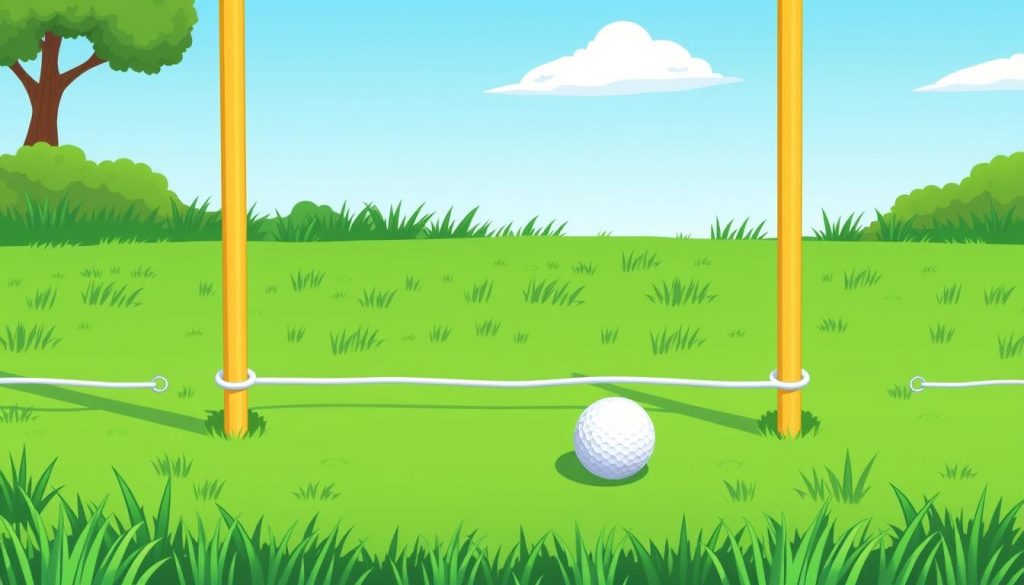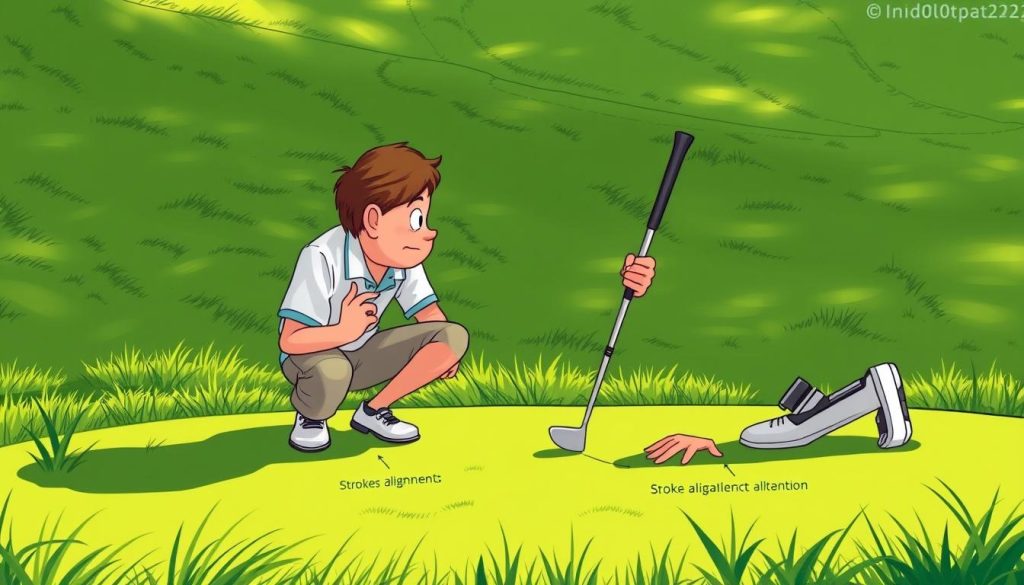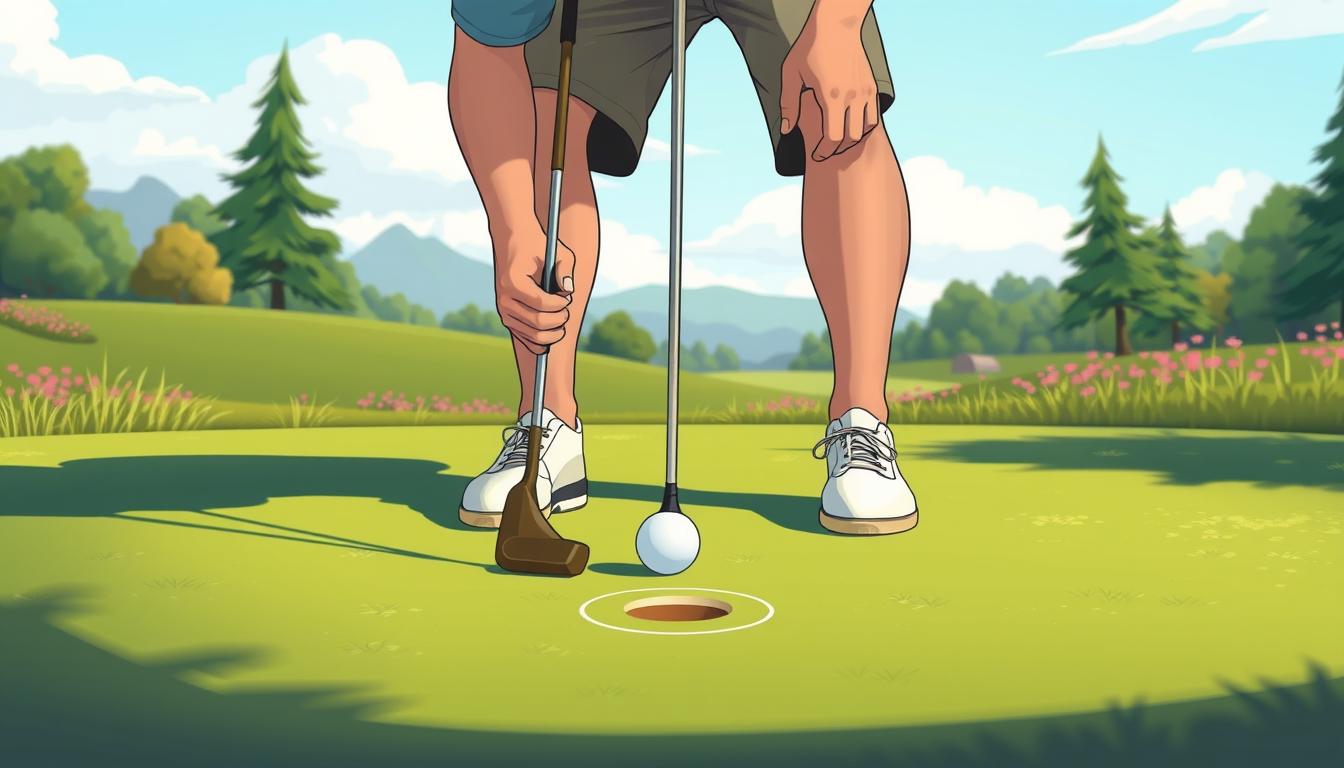Golf putting is a key skill that can greatly affect your scores. Getting your stroke alignment right is crucial for better putting accuracy and performance on the green. This guide will teach you the basics of putting alignment. It will help you lower your scores and improve your green performance.
Good putting starts with knowing how your eye position affects your alignment. Your eye’s position is vital for putting straight. Finding the best spot for your eyes over the ball takes practice and trying different things. Many golfers use a putting mirror to find their ideal eye placement.
Your body’s position is also very important for putting success. Your stance, how your weight is distributed, and your posture all help make your stroke consistent and accurate. By paying attention to these, you can build a strong foundation for your putting technique. This will help you putt more accurately on the greens.
Key Takeaways
- Proper alignment is essential for putting accuracy and lower scores
- Eye position plays a crucial role in putting straight
- Body position and stance contribute to putting success
- Using training aids like putting mirrors can help improve alignment
- Consistent practice is key to mastering putting stroke alignment
Understanding the Fundamentals of Putting Alignment
Mastering putting fundamentals is key to lowering your golf scores. Golfers use the putter more than any other club. Perfecting your putting stroke can greatly improve your game. Let’s look at the main parts of putting alignment to help you make more putts.
The Role of Eye Position in Alignment
Your eye position is crucial for seeing the putt alignment right. If your eyes are too far forward or back, you might misread the target line. Try to place your eyes right over the ball for the best view of the putt’s path.
Impact of Body Position on Putting Success
Your body position affects your putting success. A stable stance with your weight evenly distributed helps control the stroke. Professional golfers spend a lot of time perfecting their setup for the best ball-striking position. Try to find a comfortable, repeatable stance for better results.
Understanding the Target Line
The target line is the path your ball needs to follow to reach the hole. Proper alignment means aiming the putter face straight to this line. Practice your alignment by focusing on 15-foot putts. This distance helps you feel the direction and speed control.
By focusing on these putting fundamentals, you can develop a reliable stroke. Remember, even small misalignments can lead to missed putts. So, pay close attention to these details to lower your scores and aim for under 30 putts per round.
Essential Components of the Putting Stroke Alignment Guide
Mastering the perfect putt requires attention to several key elements. Your putter face alignment is crucial for sending the ball on its intended path. Start by aiming the putter face squarely at your target. This sets the foundation for a successful stroke.
Stance width plays a significant role in your putting stability. Position your feet about 2.25 to 2.75 inches from the inside edge of the ball. This width provides a solid base while allowing for a smooth pendulum motion.
Weight distribution is another vital factor. Tilt forward at your waist until the putter rests naturally on the ground. This posture promotes a consistent stroke and helps maintain balance throughout your putt.
Grip selection can make or break your putting game. Choose a grip that feels comfortable and allows you to hold the club as an extension of your arms. Many pros, including Jack Nicklaus and Arnold Palmer, favored the reverse overlap grip for better control.
Avoid common mistakes like positioning the ball too far forward or keeping your hands behind it. These errors can lead to misalignment and inconsistent contact. Remember, proper shoulder positioning is key to maintaining a smooth, pendulum-like motion.
- Aim putter face at target
- Position feet correctly
- Distribute weight evenly
- Select a comfortable grip
- Avoid common setup errors
By focusing on these essential components, you’ll build a solid foundation for improving your putting stroke alignment. Practice these elements regularly to see significant improvements in your short game.
Setting Up Your Optimal Putting Position
Improving your golf game starts with mastering your putting setup. A good stance and alignment can greatly increase your accuracy on the green. Let’s look at the important parts of a great putting position.
Proper Ball Position
Where you place the ball is key to your putting success. Line up the ball with your shirt buttons for consistent contact. This setup helps you make a smooth, pendulum-like stroke.
Stance Width and Weight Distribution
Your stance affects your putting stability. Stand with your feet shoulder-width apart for balance. Keep your weight evenly on both feet to control your stroke. This balance helps you make a steady, consistent motion.
Putter Face Alignment Techniques
Aligning your putter correctly is crucial for accurate putting. Here are some tips to help:
- Use the putter’s alignment aids (lines or dots) to square the face to your target line
- Practice with alignment sticks to reinforce proper positioning
- Experiment with different visual cues to find what works best for you
About 80% of beginners make common alignment mistakes. Focus on ball placement, stance, weight balance, and putter alignment to improve your putting. With consistent practice and attention to detail, you’ll develop a reliable putting stroke.
Using Visual Alignment Tools and Training Aids
Visual alignment tools and training aids are great for golfers wanting to get better at putting. They help you improve your technique and feel more confident on the green.
String Line Training Method
The string line drill is a simple yet effective way to visualize a straight putt. Set up an elevated string from your ball to the hole. This creates a clear path for your eyes to follow, helping you align your body and putter face correctly.

Alignment Sticks and Gates
Alignment sticks are versatile training aids used by many tour players. Create a “T” shape with the sticks to guide your setup. Place tees as a gate for your ball to roll through, ensuring a straight path. This method improves your aim and helps you maintain a consistent stroke.
Putting Mirrors and Guidelines
Putting mirrors are excellent for checking your eye position and improving your setup consistency. They provide instant feedback on your alignment and help you develop a repeatable pre-putt routine.
| Training Aid | Benefits | Usage Rate |
|---|---|---|
| String Line | Improved visual alignment | 70% of pros |
| Alignment Sticks | Versatile for full swing and putting | 90% of tour players |
| Putting Gates | Enhanced stroke path control | 65% of teaching pros |
| Putting Mirrors | Consistent setup and eye position | 80% of serious golfers |
Adding these training aids to your practice routine can greatly improve your putting alignment and overall performance. Remember, consistent practice with these tools is key to seeing real improvements in your game.
Mastering the Perfect Grip for Alignment Control
Getting your putter grip right is key for better alignment. The way you hold your hands and the pressure you apply can greatly affect your game. Start by standing 2.25 to 2.75 inches from the ball’s edge.
Try out different grip styles to see what works for you. Some like the traditional grip, while others prefer the claw or cross-handed method. Make sure your hand position feels natural and allows for a smooth swing.
The pressure in your grip is also important for control. Aim for a light, consistent pressure during your stroke. This helps you feel the ball better and keeps your alignment steady. A relaxed grip can also improve your accuracy.
- Experiment with various grip styles
- Focus on consistent hand positioning
- Maintain light grip pressure
- Use alignment aids on your putter
Many putters have visual aids like lines or dots to help you aim. These can make it easier to line up your putt. Use these tools to improve your aim and boost your confidence.
Practice is essential to perfect your grip and alignment. Add straight putt drills and games to your routine. With practice, you’ll find the grip that suits your style and enhances your game.
Advanced Techniques for Reading Green Slopes
Mastering green reading is key to better putting. Knowing about break points, grain direction, and speed control can help you make more putts. This will also lower your scores.
Understanding Break Points
Break points are spots on the green where the ball’s path changes. To find them, walk around the putt and look at it from different sides. The high point of the green is often where the ball starts to break toward the hole.

Identifying Grain Direction
Grain direction affects how the ball rolls. Putts into the grain go slower, while those with the grain go faster. To find the grain direction, look for color changes in the grass or feel the grass with your hand.
Adjusting your stroke based on grain direction helps with speed control.
Speed Control Considerations
Speed control is crucial for good putting. Faster putts break less, while slower ones break more. Practice putting from different distances to feel the green’s speed.
Consider the slope’s steepness and the grass’s wetness when judging your putt’s force.
To improve your green reading, try the plumb-bob method. Hold your putter vertically in front of your face, aligning it with the ball and hole. The putter head’s tilt shows the slope direction, helping you read breaks better.
Remember, visualization is important. Before each putt, imagine the ball’s path to the hole. This mental practice improves your focus and confidence in your stroke. With practice, you’ll get better at reading greens and making more putts.
Building a Consistent Pre-Putt Routine
A strong pre-putt routine is crucial for better golf. It builds muscle memory and boosts confidence. Let’s look at how to create a routine that suits you.
Begin by setting up your stance. Stand with your feet shoulder-width apart and align your body with the target line. Then, hold your putter in a way that feels right. Practice this setup often to make it feel natural. Begin by setting up your stance. Stand with your feet shoulder-width apart and align your body with the target line. Then, hold your putter in a way that feels right. Practice this setup often to make it feel natural. Incorporate stance optimization techniques explained by experts, such as adjusting your weight distribution and ensuring a relaxed posture. Over time, these small adjustments can greatly improve your consistency and overall performance on the green.
Take a few practice strokes to get a feel for the putt. Keep a steady tempo, aiming for 72-80 beats per minute. This rhythm makes your stroke smooth and consistent.
Visualization is key. Take a deep breath and imagine the ball going into the hole. This mental practice boosts your confidence and focus.
Make your routine your own. Adjust your foot position and grip for comfort. Change one thing at a time, mastering it before moving on. This way, your routine will feel natural and boost your confidence.
| Step | Purpose | Tip |
|---|---|---|
| Setup | Establish consistent alignment | Use alignment sticks for practice |
| Grip | Ensure control and feel | Practice near the hole for consistency |
| Practice strokes | Build muscle memory | Maintain 2:1 tempo for distance control |
| Visualization | Boost confidence | Take slow, deep breaths to focus |
Consistency is crucial. Do your pre-putt routine for every putt, in practice or games. This repetition builds muscle memory, leading to more accurate and confident putting.
Common Alignment Mistakes and Their Solutions
Improving your putting game starts with mastering alignment. We’ll look at common mistakes and how to fix them. This will help you play better on the green.
Face Angle Issues
The angle of your putter face affects your putt’s path. A small mistake can make your ball miss the hole by a lot. To fix this, try a string drill.
Set up a 6-foot putt with alignment sticks forming a “T” shape. Leave a small gap for your putter head. This drill helps you find the right start line and improve your technique.
Setup Position Errors
Being off in your setup can cause unpredictable putts. Keep your ball position, stance width, and weight distribution the same. The S7K Standing Putter has a special alignment guide.
It lets you set up and then check your position. For short putts, the Odyssey Golf 2021 Ten Putter with Triple Track alignment aid boosts your confidence and accuracy.
Alignment Perception Problems
It’s easy to misread the correct line. Use tools like the Waddaplaya Zenlightenment Alignment Marker to improve your alignment skills. This tool makes play faster and helps you read the green better.
For those with vision issues, the Evnroll ER5 Hatchback Mallet Putter has clear alignment tools and high contrast. Regular practice with these tools will make your alignment better, leading to more consistent and accurate putts.
FAQ
Why is putting alignment crucial for golf performance?
How does eye position affect putting alignment?
What are the key components of proper putting alignment?
How can I improve my putter face alignment?
What is the string line training method?
How do I choose the right grip for putting alignment?
How can I improve my green reading skills?
Why is a pre-putting routine important?
What are some common alignment mistakes and how can I fix them?
How does TrackMan data help with putting alignment?
Source Links
- https://skillest.com/blog/master-the-art-of-golf-putting-a-comprehensive-guide-for-beginners/
- https://hackmotion.com/putting-stroke-tips/
- https://golf-upgrades.com/blogs/golf-upgrades-blog/fundamentals-of-a-putting-stroke?srsltid=AfmBOoqkiQOQTn05QbXrylMqPLiOVlxEbGeHVhY13jbwQ9yKVIoVe-Kz
- https://thegratefulgolfer.com/2023/04/13/putting-fundamentals-not-just-for-beginners/
- https://face-on-putting.com/basic-setup/
- https://skillest.com/blog/putting-like-brad-faxon-tips-to-improve-your-putting-stroke/
- https://devereuxgolf.com/blogs/live-proper-blog/putting-alignment-tips?srsltid=AfmBOooo1DoNJtnntsZQzokg-ycRJYk8N6iok2sMRPMxH3FVRp8jSVRr
- https://visioputting.com/
- https://swingtrainer.com/blogs/instruction/golf-alignment-sticks?srsltid=AfmBOoooCzFDiGfpHj-gt9gkvKtSGa84Us_Z4JWkvdy4MrFcWHekP90p
- https://devereuxgolf.com/blogs/live-proper-blog/putting-alignment-tips?srsltid=AfmBOoqn7sbkHZwo4F67pFz3kXqETST9bGkMK9bc-hi3BOU9aUovy-24
- https://www.pgaplay.co.uk/learn/the-definitive-guide-to-mastering-the-art-of-putting/
- https://stix.golf/blogs/rough-thoughts/how-to-read-greens-a-golfer-s-guide-to-sinking-more-putts?srsltid=AfmBOop61qEizZBTbel4_lYpGf9yBnnv8AVxTTHvETFFm4eCraUaCIrn
- https://www.golfzonleadbetter.com/blogs/putting-tips-how-to-read-a-green/
- https://superiorgolf.blog/routine-for-consistent-putting/
- https://devereuxgolf.com/blogs/live-proper-blog/putting-alignment-tips?srsltid=AfmBOoqWA2Mbiywblo-4z7lNr77uxlnVjK-RkPn6PeH5-JMCvt0Dswml
- https://golf.com/instruction/putting/struggle-putting-aim-intimidating-drill-jackson-koert/
- https://www.golfsidekick.com/putters/best-putter-for-alignment/
- https://www.golfcare.co.uk/blog/2022/08/how-to-use-golf-alignment-sticks/


